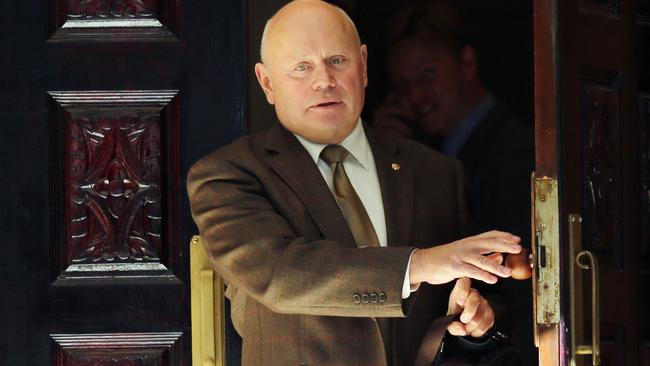Russians out: Canberra joins West’s Putin revolt
Russia may respond to expulsion of spies with random cyber attacks on top of tit for tat action.

The Turnbull government’s decision to expel two Kremlin spies as part of a global response to Russia’s chemical-weapon attack on a double agent in Britain was a calculated move to send Moscow a message that ASIO was targeting its espionage activity in Australia.
Australia yesterday joined 23 other Western countries in booting out Russian diplomats, in a co-ordinated warning from the West that Russia’s alleged use of a nerve agent against Sergei Skripal and his daughter in Salisbury on March 4 would not go unpunished.
The expulsion of more than 100 Russian diplomats thrown out of Europe, North America and Australia marks the largest co-ordinated peacetime expulsion of Russian intelligence officers.
Australian intelligence sources yesterday claimed that Moscow could respond “below the radar”, with random cyber attacks on top of expected expulsions of Australian diplomats.
Malcolm Turnbull yesterday declared Russia’s actions represented a criminal and “reckless attack on the sovereignty of nations”. The Prime Minister gave the two Russian spies seven days to leave Australia as Foreign Minister Julie Bishop flagged a possible diplomatic boycott of the soccer World Cup to be held in Russia this year.
Ms Bishop later clarified that reports of a wider boycott were not correct. Football Federation Australia, which sought information about any boycott, later issued a statement: “As things stand all qualifying teams, including the England team, will be taking part in this FIFA event and that continues to be our intention.”
Strategic experts in Australia said the West had drawn a red line with the Kremlin, but warned that continued aggressive behaviour by Russia could push the world closer to military conflict.
Attorney-General Christian Porter yesterday confirmed the decision to expel two undeclared intelligence officers from the Russian embassy in Canberra was not purely for diplomatic reasons, suggesting it had been a deliberate move to send a warning to Russian President Vladimir Putin.
The Australian has learned through intelligence sources that ASIO already had the two Russian spies under surveillance. They will be the first Russians to be expelled from Australia since Valery Ivanov, the first secretary of the Soviet embassy in Canberra, was thrown out by Bob Hawke for spying.
The Australian has been told the two Russian officers, whose names have not been released, were “highly skilled” operatives based in Canberra, who travelled freely. It is understood they were observed by ASIO moving widely about the country, cultivating potential agents under the guise of diplomatic cover.
Neither was a declared intelligence officer — meaning their identities were not disclosed to ASIO and they were effectively working in a liaison function. They are listed as attaches under the Department of Foreign Affairs and Trade’s diplomatic list, which reveals the Russian embassy as housing 16 officials including ambassador Grigory Logvinov.
Sources familiar with the case said the two officers were understood to be “very good” operatives.
Mr Porter said the two diplomats were expelled “because they have been identified by our intelligence officers as undertaking intelligence activities on behalf of the Russian government”.
The Attorney-General said that under the government’s proposed foreign interference and espionage laws, which are being reviewed by the parliamentary joint committee on intelligence and security, the two diplomats might have been prosecuted.
ASIO has warned that espionage and foreign interference in Australia has reached a level of activity not seen since the height of the Cold War. Mr Turnbull said the Western response had been “carefully calibrated”.
“The force of it comes from the large number of countries that are undertaking the expulsion of Russian diplomats,” he said.
“It is a very, very strong, concerted response and it is one that sends a clear and unequivocal message to the Russians.”
The expulsions are the first in Australia since then foreign minister Bob Carr expelled the Syrian diplomat, Chargé d’Affaires Jawdat Ali, in 2012.
Ms Bishop said the government was preparing for the Kremlin to retaliate by expelling Australian diplomats from the mission in Moscow. The Foreign Minister cited the annexation of Crimea and the shooting down of Malaysia Airlines flight MH17 as two other examples of Russian aggression that demanded a global response.
The Russian embassy posted a response to Australia’s actions, accusing it of blindly following Britain while repeating its denial of being involved in the assassination attempt.
“It is regrettable that by virtue of the notorious Anglo-Saxon and Euro-Atlantic solidarity, the relatively small but substantial positive asset in our relationship, which we had managed to create by a joint effort during the last two years, was jeopardised,” the embassy said.





To join the conversation, please log in. Don't have an account? Register
Join the conversation, you are commenting as Logout